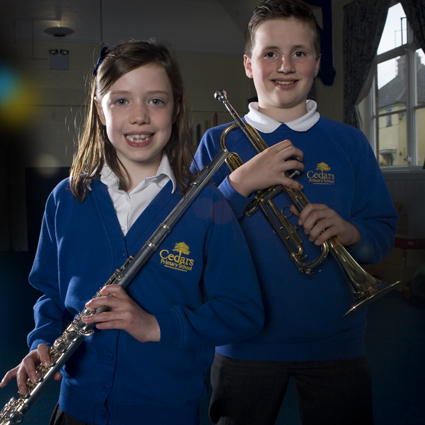At Cedars Primary School and Nursery, our intent is to cultivate a learning environment where every child feels happy, cared for, and capable of achieving success. We aim to develop well-rounded individuals who are prepared for the challenges of the future.
We recognise that our children enter school from a range of different settings and increasingly from culturally diverse backgrounds. We encourage children from an early age to share and celebrate this diversity.

Our curriculum is designed to be both broad and balanced, and is in alignment with the National Curriculum. We strive to offer a diverse range of subjects and learning experiences that ensure all students acquire essential knowledge and skills. Clear sequential progression in teaching ensures knowledge builds systematically.
To make the learning relevant, cross-curricular links and references to prior learning are made wherever possible and children are encouraged to apply skills and knowledge from all areas to complete real-life challenges and investigations. A variety of teaching strategies are employed based upon research from The Rosenshine Principles.
English and Math skills are taught daily to ensure our children become competent and proficient learners. Reading is prioritised to ensure children access our full curriculum and leave with the skills to support them in their future lives. Mathematical fluency and confidence is key and concepts are embedded to ensure competency and extended to provide challenge.
Homework tasks support and consolidate learning.
Our curriculum is designed to give all pupils, including those with SEND or those with different experiences or starting points, the knowledge and skills they need to be independent learners and to be prepared for the next steps in their learning journeys.
Our classrooms are bright, active places to learn; displays value achievement and working walls aid children through mapping the stages of a learning task, identifying the steps to success and key subject vocabulary.
We enrich our curriculum through the use of visits within the locality, residential visits in Y4 and Y6 and themed learning days/weeks. As a school we recognise our children’s love of the arts and sport. We have developed specialist classrooms for music and art and employ a specialist coach to enhance our sport provision. We provide numerous opportunities for our children to be involved in representing our school in a variety of disciplines in our local community.
The school and our parents have high expectations of our children and set aspirational goals. As a result, we provide character building opportunities for children to develop their leadership skills and promote positive attitudes to learning, valuing achievements both within and outside the school day. We do our utmost to boost and encourage self-esteem and encourage a growth mindset through all aspects of learning. We encourage ‘pupil voice’ and listen to innovative ideas from our children. Our children are confident communicators who are continually developing and learning and, through encouragement and good modelling, they learn how to work together respectfully and tackle new challenges with resilience.
Spiritual, moral, social and cultural understanding (SMSC) is integral to our school curriculum and ethos and is woven through day to day classroom activities such as discussion and circle times, check ins, through assemblies, curriculum content and skills. We have an expectation of good manners and behaviour and this is evident in the relationships established between children themselves and between children and adults in our school. Recognition is awarded for children who have stood out to a member of staff either academically or socially with both effort and achievement being celebrated. We teach Restorative Principles, encouraging children to analyse their behaviour and the impact it has upon others and how to make informed choices for the future.
Foundation Subjects: These are taught individually, ensuring depth and focus in each area. The spiral curriculum model allows us to revisit key concepts, ensuring that learning is cumulative and coherent. We teach using these schemes: Kapow, Jigsaw and Purple Mash
Curriculum Overview Maps: Our maps provide a clear outline of the curriculum, showcasing the progression of learning from EYFS through to KS2. These maps highlight the integration of single and mixed age ranges and are designed to adapt to the needs of our pupils.
We recognise that what children learn through their primary years of schooling contributes directly to their success in the future and therefore, we aim to give our children the best possible opportunities through the curriculum and the experiences we offer to ensure our children are well prepared for their next stage of learning.
